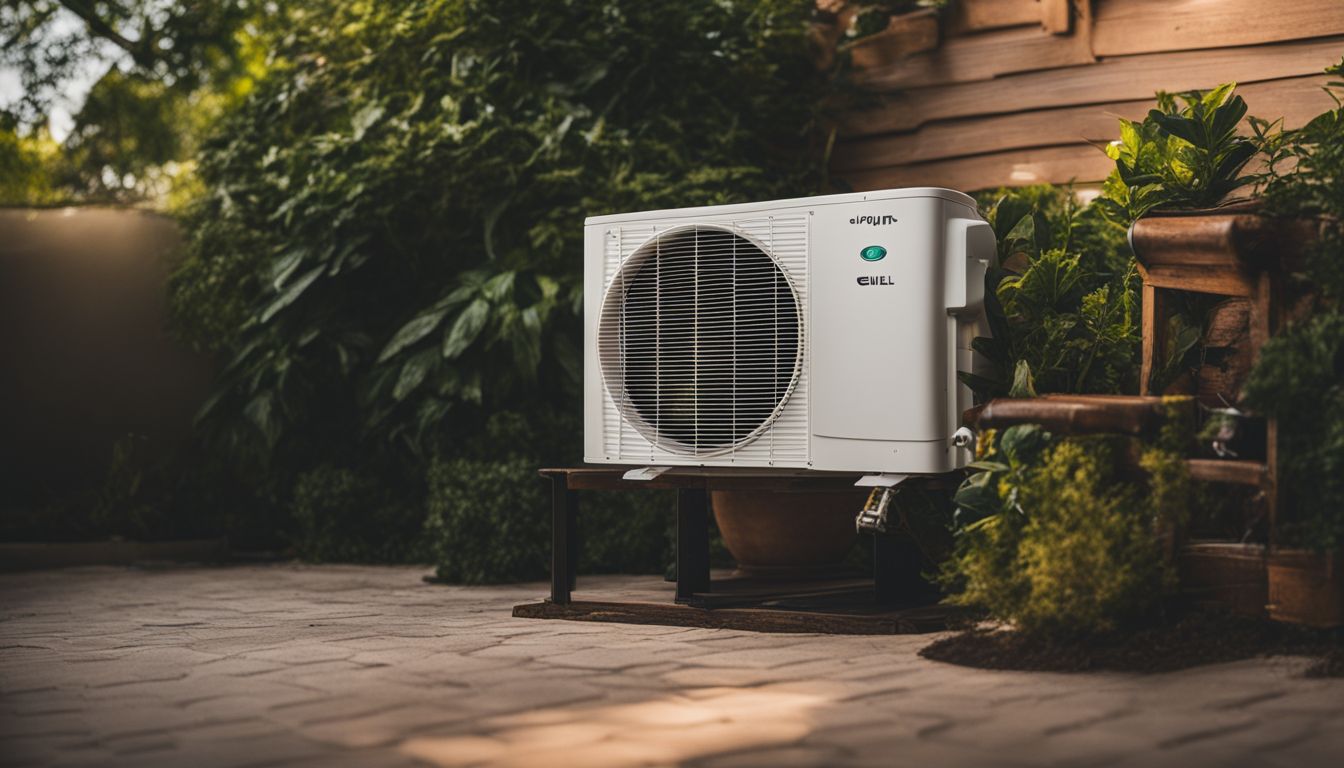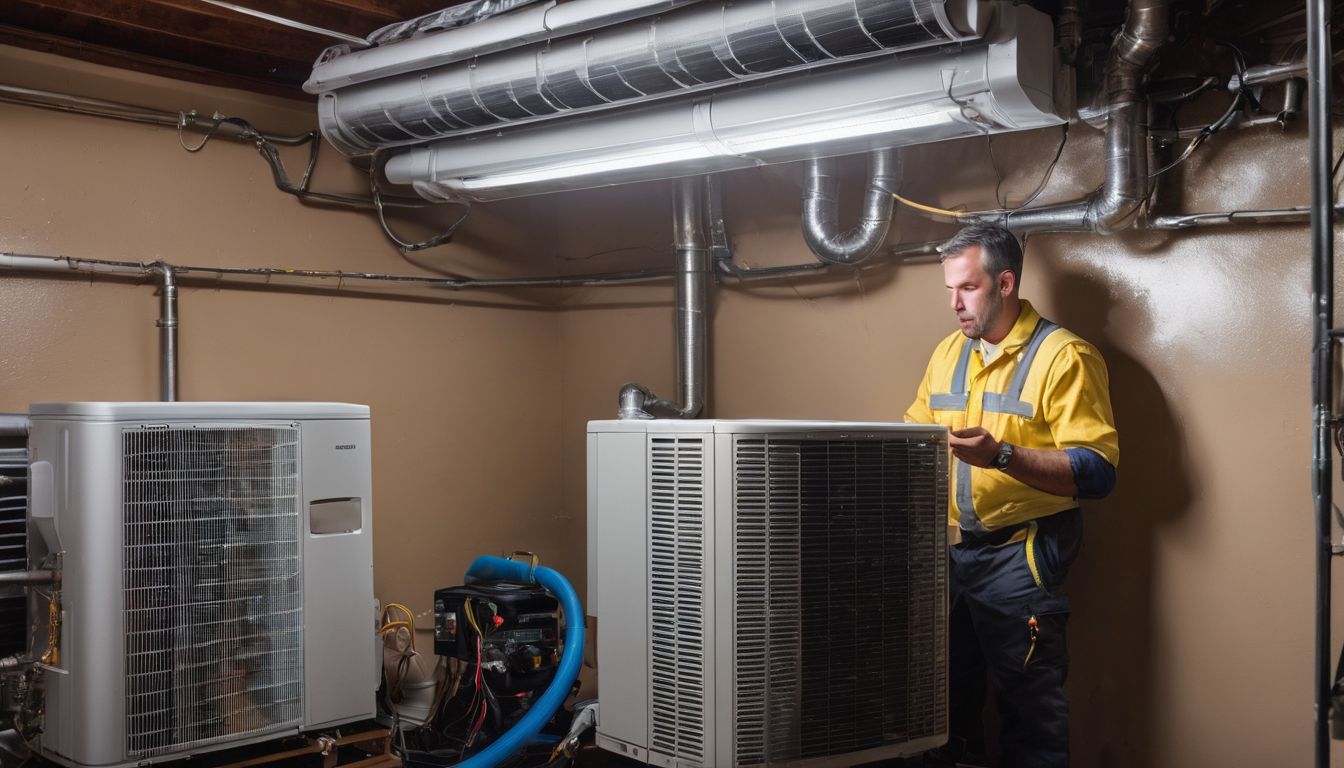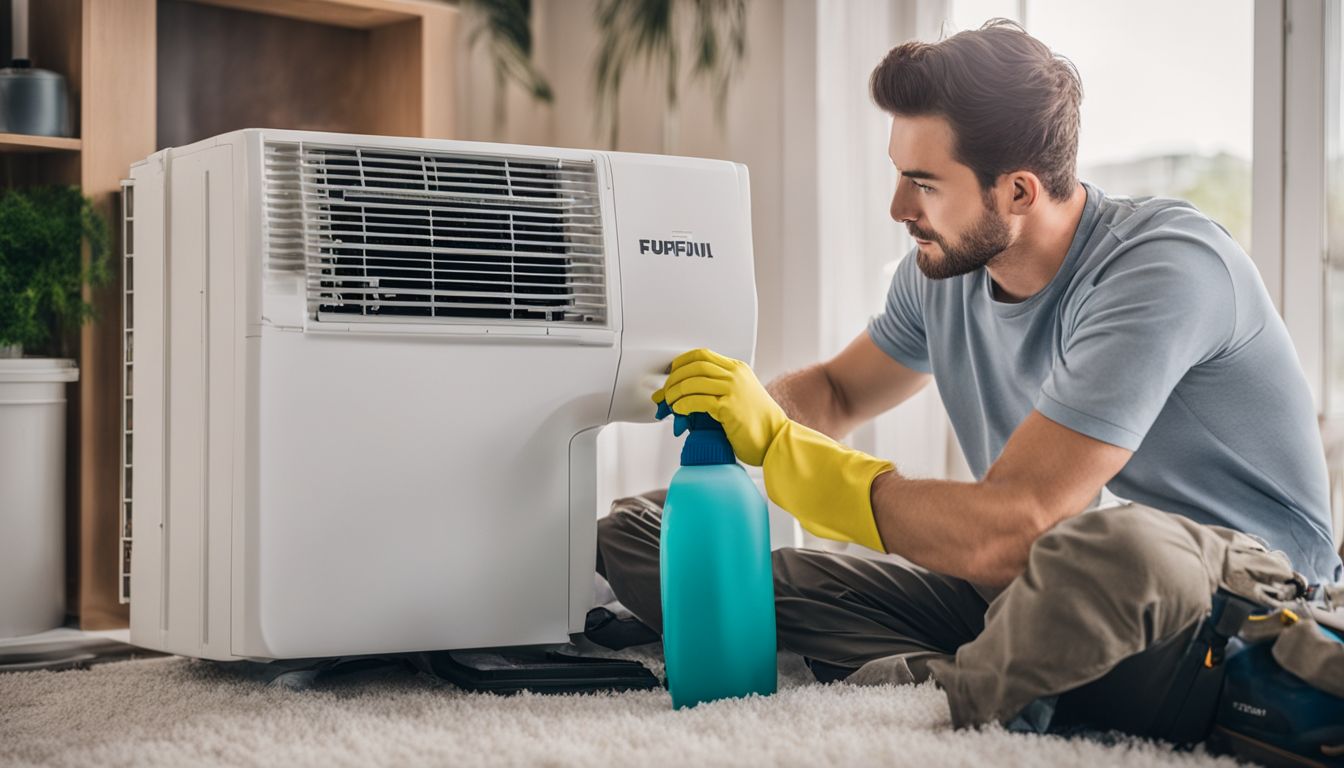Your air conditioner’s drip-drip sound could be a sign of condensation trouble. Poor insulation often turns your cool aircon into an unwanted water feature. This article will guide you through recognising causes and providing actionable fixes to keep your AC dry and efficient.
Ready? Let’s stop that drip!
Understanding Aircon Condensation
Aircon condensation is a natural process where water vapour in the air turns into liquid on cold surfaces. Inside an air conditioning system, the evaporator coil gets very cold and comes into contact with warm indoor air.
This meeting of cold coil and warmer air causes moisture from the air to condense on the surface of the coil.
Condensation within your AC unit needs proper management to prevent issues like mould growth or water damage. The system should efficiently collect and drain this moisture away so it doesn’t cause problems in your home or office.
But if there are flaws in how your AC unit is designed, installed, or maintained, you might see excessive water accumulation leading to leaks that can damage property. It’s crucial for homeowners and building managers alike to understand this aspect of their heating and cooling apparatuses for efficient functioning and longevity.
Identifying Causes of Aircon Condensation
Discovering the culprits behind aircon condensation can be crucial for ensuring your unit’s efficiency and longevity. Unearthing these factors will guide you to tailored solutions that keep moisture in check and maintain optimal comfort levels.
Poorly Installed Trunk
A poorly installed trunk can be a major cause of condensation problems in air conditioning systems. If the ductwork that constitutes the trunking isn’t correctly fitted, gaps and leaks can form.
This allows warm air to enter and mix with the cool air flowing through the system, leading to unwanted moisture accumulation.
Correcting this issue requires attention to detail during installation. Technicians must ensure every segment is securely connected without any space for air leakage. Insulation around these areas is crucial too; it prevents the cold surface of the ducts from coming into contact with warm, humid ambient air.
When insulation materials are insufficient or missing, water vapour readily condenses on the cold surfaces resulting in dripping water and potential damage over time. Ensuring proper sealing and insulation minimises risks of moisture build-up, protecting not only your home but also enhancing the efficiency of your heating and cooling systems.
Inadequate Insulation
Inadequate insulation around your air conditioning unit allows cool air to escape and warm, moist air to seep in. This can lead to increased condensation within the system, causing water dripping and potentially damaging surrounding areas.
Insulation acts as a barrier preventing the transfer of heat between the inside of the ducts and the warmer external environment.
Over time, exposure to weather elements like UV rays can degrade your insulation material. It’s essential for maintaining indoor air quality that you inspect your AC’s insulation regularly.
Replacing old or damaged insulation helps maintain the optimal functioning of your HVAC system and prevents mould growth caused by excess moisture. Well-insulated aircon trunking ensures efficient operation, reduces energy costs, and extends the lifespan of your heating and cooling systems.
Blocked Trap Floor
A blocked trap floor in your aircon unit spells trouble, often leading to annoying and possibly damaging condensation issues. This blockage is usually due to moisture buildup that clings to dust and debris over time, creating an impenetrable barrier.
Without a clear path, the water that should drain away gets stuck, increasing the risk of overflow from your air conditioner.
Regular checks can prevent such blockages from affecting your HVAC system’s efficiency. Clearing out any accumulated gunk will ensure the trap floor functions properly, guiding condensate safely away into the drip line instead of letting it pool within the trunking or spilling into basements.
Proper aircon maintenance includes monitoring these potential problem areas before they cause major headaches down the road.
Humid Air
Humid air plays havoc with your aircon’s ability to function correctly. High humidity levels force the unit to work harder, leading to excess condensation that can result in leaks.
This extra strain can negatively impact not just the performance but also the lifespan of your air conditioner.
To keep things under control, you should regularly check and replace dirty air filters, as clogged filters exacerbate humidity problems within the system. Also, consider pairing your unit with a dehumidifier during those sticky months when the outside dew point temperature soars.
Proper maintenance ensures high humidity doesn’t derail your comfort indoors.
Low Temperature Setting
Setting your aircon to a very low temperature might seem the best way to keep cool, especially during hot spells. However, this can backfire by causing extra condensation inside your unit.
As the cold air blasts through the system, it chills room air quickly and turns moisture into water droplets faster than normal. This excess moisture has to go somewhere, often leading to leaks or puddles where you least expect them.
Keep an eye on that thermostat; turning it down too much not only strains your HVAC system but also invites condensation issues into your home or office space. A moderate and stable setting is key for balancing comfort with preventing unwanted dampness from forming around your air conditioner’s evaporator coils.
If you’re experiencing persistent problems with condensation despite reasonable temperature settings, it may be time for a professional assessment of your unit by a qualified aircon technician.
Restricted Airflow
Restricted airflow in your air conditioning system can create a perfect storm for condensation issues. Clogged air filters are often the culprit, trapping dust and debris and hindering the flow of air through your HVAC system.
This buildup not only strains your unit but also contributes to stagnant air pockets where moisture can accumulate and condense.
It’s not just dirty filters that block smooth circulation; obstacles within the air ducts or around the outdoor compressor can be equally problematic. Regular maintenance involving vacuuming out any blockages with a vacuum cleaner, checking for twigs or leaves jamming the outdoor unit, and ensuring no furniture is covering indoor vents will keep the air moving as it should.
Keep an eye on these potential problem areas to help prevent restricted airflow from leading to damp complications in your heating and cooling setup.
Red Flags When Your AC Needs Expert Attention
Leaking water around your air conditioner is a serious concern. It suggests a possible breakdown in the condensate pump or clogging within the condensate drain and requires immediate inspection from an HVAC technician.
Strange and unusual noises, such as persistent buzzing, point to potential debris hindrance or electrical complications that warrant quick expert analysis.
Be alert for signs of weak airflow coming from your AC vents; this could mean there’s a blockage in your system. If unpleasant smells accompany poor ventilation, it’s likely due to mould or mildew forming inside the ductwork, which poses health risks besides damaging the unit.
Noticing these foul odours means it’s time to call in professionals who can properly diagnose and resolve the issue.
Warm air output signals that something isn’t functioning correctly within your heating and air conditioning system. Frequent cycling, higher-than-normal humidity levels inside your home, unexpected pools of water near the unit, and strange scents or sounds are all indicators you shouldn’t ignore.
These symptoms suggest that various elements of your AC might be failing – from old pipes leaking refrigerant to malfunctioning electrical wiring – each requiring specialist skills for repair.
If you spot any of these red flags with your own aircon unit, react promptly by getting an expert involved before minor issues transform into major malfunctions.
Solutions to Prevent Aircon Condensation
Regular checks on the insulation of your AC trunking can save you from condensation issues. If you find any damage, don’t hesitate to repair or replace it. This step ensures moisture doesn’t build up and becomes a bigger problem.
Also, make sure your aircon’s joints are correctly installed to prevent leaks where they shouldn’t occur.
Another key solution involves maintaining proper ventilation in spaces with air conditioners. Good airflow prevents humid air from becoming stagnant and forming condensation. Look into adding dehumidifiers if your area is naturally more humid; this helps keep the indoor climate at an ideal humidity level for your HVAC systems.
Remember, handling these solutions effectively keeps indoor air quality high and extends the life of your electrical cables, gas pipes, and other building infrastructure hidden behind walls and above ceilings.
Conclusion

In tackling aircon condensation, meticulous attention to detail can save you from future frustrations. Always check your AC’s installation and keep an eye out for any signs of moisture buildup.
Address insulation issues promptly and ensure that airflow is unrestricted throughout the system. Remember, a well-maintained aircon not only cools efficiently but also stands strong against the pitfalls of condensation.
Keep those ducts dry and your living spaces comfortable by staying proactive about your air-conditioner’s health.
FAQs
1. What causes condensation in the aircon?
Aircon condensation usually happens when moist air inside your home hits the cold surfaces of the a/c unit, causing water to collect and condense.
2. How can I stop my aircon from sweating so much?
You can prevent your air-conditioner from excessive sweating by ensuring good airflow, servicing it regularly, and checking that your building envelope is properly sealed.
3. Is it okay to clean my leaking A/C with a microfibre cloth?
Yes, you can use a clean microfibre cloth to gently wipe away any moisture from a leaking A/C unit as part of regular maintenance.
4. Can using showers and chimneys increase A/C condensation?
Indeed! Using hot showers and chimneys frequently can raise humidity levels in your house, which may cause more condensation around the air conditioners.





